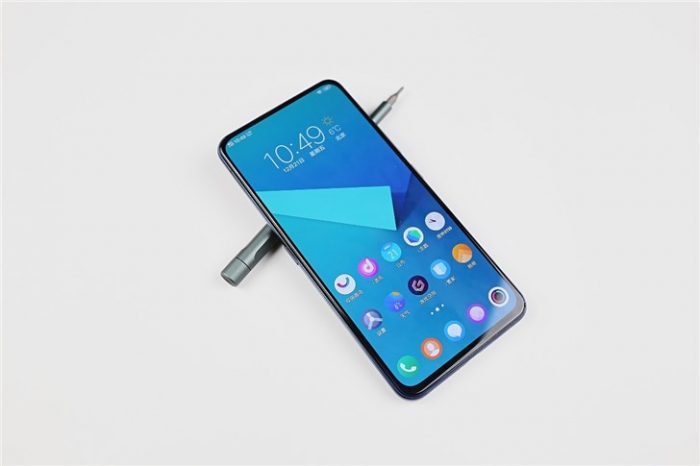Vivo held a new product conference to launch the Vivo NEX Dual Display on December 11 last year. One of this full-screen smartphone’s highlights is its dual display design. It has one display on the front and the other on the back. Today, we will explore its internal structure. Three months ago, we have dismantled Vivo NEX.

The phone boasts a 6.39-inch display with a resolution of 2340×1080 and a screen ratio of up to 91.6%. With such a full-screen design, this phone will undoubtedly deliver an impressive visual shock.
Besides, it features a 5.49-inch secondary display with a resolution of 1920×1080 on the back.
Step 1. Remove the Back Cover (Secondary Display)
Now, let’s start the teardown of this dual-display smartphone. First, remove the back cover (or the secondary display since it is placed on the back case). Before tearing down this phone, power it off. Then, use a clip to remove its SIM card tray.
There are two screws around the charging port. Remove the screws with a screwdriver.
After taking out the screws, insert a plastic card in the slot between the main display and the middle framework. Use the card to widen the slot. Now, the back cover is basically separated from the phone body.
Now disconnect the cables. Remove the screws circled blue in the picture.
Take out the metal frame.
Disconnect the battery cable first. Next, the back cover can be completely separated from the main display.
Step 2. Take out the Battery
Lift the handle slowly to remove the battery.
Step 3. Tear down the Motherboard
The motherboard is fixed by several screws. So take out the screws marked blue in the picture.
Then, disconnect the charge connector and the main display.
Meanwhile, disconnect two coaxial cables.
The phone features many cameras and relative sensors. To take out the motherboard, the camera cable needs to be disconnected. Before that, remove the metal racket on the camera cable.
Disconnect the metal racket on the earphone plug.
Disconnect all the camera cables and the earphone plug.
Now, the motherboard can be taken out.
This motherboard has a neat and simple design.
Step 4. Tear down the Cameras
Hold the camera cable and lift it up slowly. Then, all the cameras can be removed.
The component on the left is a 2MP camera with the F/1.8 aperture. The one in the middle is a 12MP main camera with an F/1.79 aperture and uses an IMX363 sensor. The module on the right is a TOF 3D camera which can receive light signals.
Step 5. Take out the Jack Plug, Motor Module, and Earphone
Use the pry to take out the jack plug.
Remove the connector below the FPC with the pry.
Now, take out the earphones slowly. The cable of FPC here is so fragile that it is easy to get broken.
Utilize a pry to remove the motor.
Step 6. Take out the Charge Connector
Take out all the screws circled blue in the picture with a screwdriver.
Carefully remove the panel protecting the charging connector cable.
Get the frame of the speaker out.
Use the pry to disconnect all the cables circled blue in the picture.
Lift the charge connector up and take it out.
Take out the display jack with a pry.
Remove the waterproof silicone from the touchscreen FPC.
Step 7. Take out the In-Display Fingerprint Reader
Use the pry to remove the IC of the in-display fingerprint reader.
Then, lift up the holder of the fingerprint scanner. In this way, the whole under-the-display fingerprint reader can be taken out.
Step 8. Remove the Dual Display
Taking out the dual displays is difficult. If you handle it improperly, the phone might not work. Therefore, we suggest you turn to a professional person for help if you need to get your display changed.
Take out the main display first. Use a hair dryer to heat the four edges of the display evenly for four to five minutes. Don’t focus on one place.
Use a sucker to separate the display from the phone body.
Now, the main display is removed.
Heat the four edges of the secondary display with a hair dryer for five to eight minutes.
Then use a sucker to take out the secondary display.
There is a lot of glue around the flash.
Teardown Summary
I found the teardown process of the Vivo NEX Dual Display to be the most difficult of all the phones I’ve ever disassembled. Its internal structure is more complex than that adopted by other phones. In addition, its dual-display design increases the difficulty of the teardown process. Therefore, we suggest you’d better not tear down the NEX Dual Display yourself in case you destroy the internal structure of the phone.